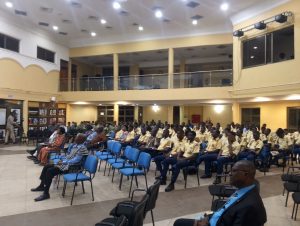Distinguished Professor of Linguistics at the University of Indiana , Bloomington, Professor Samuel Obeng Gyasi has revealed that language as an art form plays a crucial role in political communication and goes a long way to help organize society for a common goal.
The call comes on the back of the Ghana Academy of Arts and Sciences holding the 57th Edition of the Annual JB Danquah Memorial Lecture Series to celebrate the life and outstanding achievements of an accomplished lawyer , philosopher and statesman who was one of the leading lights of the liberation struggles from British control in the days of the Gold Coast .
The well attended and colourful event was held between February 24 to February 26 , 2025 at the premises of the Academy in Accra brought together top class academia , politicians and policymakers as well as students to delve deeper into the ideals JB Danquah stood for which earned him the much vaunted nickname ” Doyen of Gold Coast Politics” .
Speaking as the Keynote Speaker at the event , Professor Obeng Gyasi delved into the use of language and fax communication in the heady days of the country’s pre independence struggle where the educated elites like Dr JB Danquah employed the use of letters to draw the attention of colonial authorities to the ills happening in the political system and how it affected the collective aspirations of the ordinary Ghanaian.
The use of literary devices like prose , simile ,alliteration and convincing language by the activist scholar , Dr JB Danquah moved the authorities of the day to solve issues like corruption , high rises in goods and services , lack of access to equal opportunities in the education sector as well as social services between the locals and that of colonial authorities on their own land .
” Language as an art form plays a key role in political communication by engaging the locals to their leaders to get attention on prevailing social issues in pre independence Gold Coast , where the educated elites like Dr JB Danquah ,Dr Kwame Nkrumah , Paa Grant and their contemporaries were able to use their language skills to compel British colonial officials to avert their minds to the prevailing socioeconomic order which was fighting against the indigenes.
Through the use of fax communication and newsletters , it was easier for the concerns of the people to be channelled to the authorities in Britain to implement policy measures that alleviated the burden of the masses in a way. Language as a means of communication and a leveller between the ruled and the ruling class bridged the gap enormously in those days”.
Also, Professor Obeng Gyasi intimated that through the resistance speeches of pro independence fighters and activists like Dr JB Danquah ,Dr Nkrumah and allies after independence , when Nkrumah became President, the use of telegram and other means of writing through the press and publications kept the heat of accountability on the government when it was noticed that ,some government appointees and officials were being corrupt and abusing power , the educated elites did not shy away from using literary devices to throw more light on critical issues like the right to personal liberty , freedom and democratic freedoms .
” Realizing the powerful impact of language and communication and it’s propensity to influence the indigenes , political activists including JB Danquah and his allies continually used the medium to tell the Nkrumah government what was going wrong in the society post independence and even suggested what they believed were corrective measures to cure ills such as greed , corruption and arrogance of power which was labeled at former British Colonial officers and such activism kept the public officials on their toes at all times “.
He even further argued that the power of communication and language is even more sophisticated in today’s world of ultra competitive politics ,where the dividends of same holds sway of the destinies of millions of Ghanaians both far and near .
The inspirations of the early career political actors and activists in the 1900s and mid 1950s is evident in the political communication strategies of generations of succeeding Ghanaian statesmen and politicians over the past decades after full independence from British colonial rule as well running from the Nkrumah s to the Mahamas which Professor Obeng suggests will endure for a very long time .
Profile ;
Professor Samuel Obeng Gyasi is a Distinguished Professor of Linguistics at the Indiana University , Bloomington , USA and currently serves as the Director of the West African Languages Institute as well as Head of the newly established Indiana- University – Ghana Gateway .








